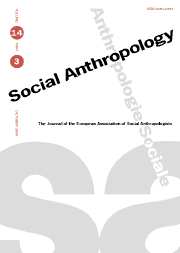Article contents
Constructing exclusion. The micro-sociology of an immigration department
Published online by Cambridge University Press: 07 October 2004
Abstract
Drawing on his work experience from the Norwegian Directorate of Immigration, the author discusses the relationship between the administrative and the political domain within the field of asylum policy. Of particular interest in this respect is the capacity and the willingness of the bureaucratic apparatus to appropriate political decisions; its readiness to use legal and administrative measures in order to avoid social and moral issues being made the subject of political deliberations. The author argues that this tendency, which has consequences in terms of ethnic exclusion, cannot be explained only by invoking racist motives among bureaucrats. Rather, we must look into how public officials see their own responsibilities and their own working situations in an era characterised by increasing transnational movement of people.
Se basant sur son expérience comme employé du Directorat norvégien de l'immigration, l'auteur analyse le rapport entre les domaines administratif et politique dans le contexte de la politique d'asile. D'une importance-clef est la capacité et la volonté de l'appareil bureaucratique de s'approprier des décisions politiques – sa disposition d'employer des mesures légales et administratives afin d'éviter que des enjeux sociaux et moraux deviennent l'objet des délibérations politiques. Ce serait trop simple d'expliquer cette tendance – qui peut facilement mener á des exclusions ethniques – seulement par le rôle des motifs racistes parmi les bureaucrates. Il vaut mieux porter l'attention sur la façon dont ces fonctionnaires conçoivent leurs propres responsabilités et leur propre situation de travail dans une ére marquée par une mobilité croissante de gens.
Auf Basis seiner Arbeitserfahrung im norwegischen Immigrationsdirektorat bespricht der Autor die Beziehung zwischen dem administrativen und politischen Bereich in der Asylpolitik. Von besonderer Bedeutung sind hier die Fähigkeit und der Wille des bürokratischen Apparats um sich politische Entscheidungen eigen zu machen, sowie seine Bereitschaft rechtliche und administrative Maßnahmen zu benutzen um zu verhindern, dass soziale und moralische Fragen zum Thema politischer Diskussion werden. Der Autor argumentiert, dass diese Tendenz, die sich auf Ausschließen aufgrund von Ethnizität auswirkt, nicht nur durch rassistische Motive unter Bürokraten erklärt werden kann. Anstelle dessen muss nachgegangen werden, wie Beamte im öffentlichen Dienst ihre eigenen Verantwortlichkeiten und Arbeitsbedingungen in einem durch zunehmende transnationale Bewegungen charakterisierten Zeitalter sehen.
Basado en su experiencia de trabajo en el Directorio Noruego de Inmigración, el autor analiza las relaciones ente la administracion pública y el estamento político en el desarrollo de políticas sociales. De especial interés resulta la capacidad y voluntad del aparato burocrático por hacerse cargo del proceso de toma de decisión; así como su disposición hacia el uso de medidas legales y administrativas para evitar que asuntos de temática social o moral acaparen la atención de las deliberaciones políticas. El autor sostiene que esta tendencia, de claras repercusiones para la exclusión étnica, no se puede explicar apelando a las motivaciones racistas de los burócratas. En vez de ello, debemos investigar el sentido de responsabilidad y el contexto de trabajo de los administradores públicos, en una era que se caracteriza por continuos incrementos en los movimientos transnacionales de personas.
- Type
- Research Article
- Information
- Copyright
- © Cambridge University Press 2004
- 30
- Cited by




